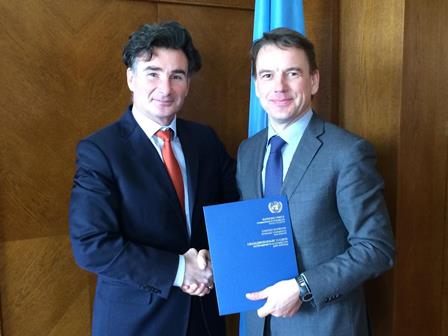
An electronic TIR system could greatly improve the efficiency, speed and transparency of the TIR system, reduce administrative burdens and increase efficiency of international freight. This is why UNECE and the International Road Transport Union (IRU) signed a Memorandum of Understanding (MoU) on 24 March to formalize their cooperation in the computerization of the TIR procedure (eTIR) and in support of the UNECE-IRU eTIR Pilot Project between Iran and Turkey.
The eTIR pilot project aims at demonstrating the possibility to conduct TIR transports electronically, with minimal investments.
The main purpose of the MoU is to facilitate the development and maintenance by UNECE of an electronic exchange platform, i.e. the light-weight eTIR international system. This platform will constitute a first step towards the implementation of the fully fledged eTIR system.
UNECE Executive Secretary Christian Friis Bach said: “UNECE and IRU agree that the future of the TIR Convention lies in computerization. Both parties are committed to achieving this goal in the nearest possible future”.
IRU Secretary-General Umberto de Pretto said: “The eTIR Pilot Project between Iran and Turkey offers a unique opportunity to demonstrate that the IT tools IRU has developed over the last years constitute an important contribution towards the implementation of the eTIR system.”
The ultimate objective of the eTIR system is to ensure the secure exchange of data between national customs systems related to the international transit of goods, vehicles or containers according to the provisions of the TIR Convention. It will also allow customs to manage the data on guarantees, issued by guarantee chains, to holders authorized to use the TIR system. In addition to replacing the current international functions of the paper TIR Carnet (i.e. the proof of existence of an international guarantee and the exchange of information between customs administrations), the eTIR system will provide further benefits such as the systematic availability of advanced information that would allow stakeholders to conduct risk assessments prior to the arrival of cargo. This automation will speed up the TIR procedure and allow all actors to significantly reduce their administrative burden and maximize the benefits of integrated supply chain management. Additionally, the exchange of customs information in a secure environment will prevent false submission of customs declarations.
For further information, please visit: http://www.unece.org/trans/bcf/etir/welcome.html

